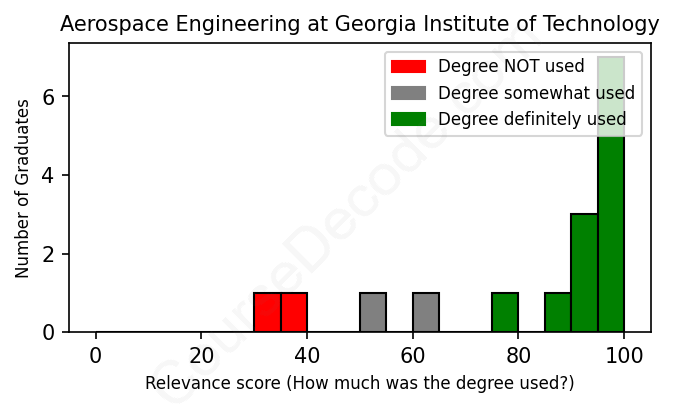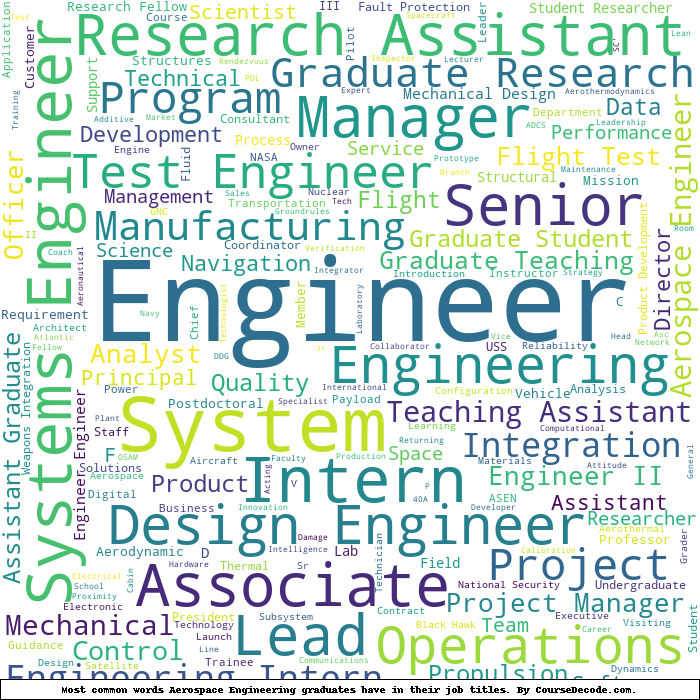
First, some facts. Of the Aerospace Engineering graduates from Georgia Institute of Technology we've analyzed , here's how many have used (or NOT used) their degree in their career:

These are estimates based on AI analysis of 16 LinkedIn profiles (see below).
The verdict? Significantly above average. Overall, with an average relevance score of 82%, Aerospace Engineering graduates from Georgia Institute of Technology have a much higher likelihood (+15%) of finding work in this field compared to the average graduate across all fields:
And for comparison, here's the chart for all profiles we've looked at across all degrees.
Also, after graduating, 56% of these graduates have pursued further education other than another Bachelor's degree (such as a Masters degree or other), compared to the average across all profiles of 35%. This suggests you may need more than just a Bachelors degree to be competitive as a Aerospace Engineering graduate.
See the details:
|
Relevance score: 100% We think this person has gone into a career highly relevant to their degree. We think this person has gone into a career highly relevant to their degree.
DEGREE INFOGraduated in 2019 from Georgia Institute of Technology with a Bachelor of Science - BS in Aerospace Engineering. Also pursued further education since (see below). JOB HISTORY SINCE GRADUATIONAerospace Engineer Air Force Life Cycle Management Center May 2020 - Present FURTHER DEGREES DONE SINCE GRADUATINGMaster of Science - MSGeorgia Institute of Technology 2021 - 2022 ABOUTNo information provided. |
The top 10 most common jobs done by the graduates we've analyzed (ranked most common to least) are:
Based on the job data from LinkedIn profiles of Georgia Tech Aerospace Engineering graduates, it’s clear that a lot of them have landed roles at major aerospace companies like Boeing, Northrop Grumman, and NASA. The most common job titles among these alumni include various engineering roles such as Systems Engineer, Mechanical Engineer, and Project Engineer. Many of these positions are directly related to aerospace engineering, focusing on things like designing aircraft systems, conducting flight tests, and working on propulsion systems. For instance, positions like Mechanical System Design & Analysis Engineer and Aerothermal Engineer show a direct application of the skills they learned during their degree program.
However, it's interesting to note that not every job is heavily focused on aerospace principles. Some graduates have taken on roles in project management or even more unrelated fields, like technical recruiting or operations management, which don’t leverage their aerospace engineering background as much. Jobs like Instructional Strategist or Associate at a consulting firm may involve some engineering skills but have limited relevance to aerospace. Overall, while many alumni are working in roles that utilize their aerospace knowledge, there are also instances where graduates have strayed into positions that aren't fully aligned with their degree, reflecting a diverse range of career paths following their education.
Here is a visual representation of the most common words in job titles for Aerospace Engineering graduates (this is across all Aerospace Engineering graduates we've analyzed, not just those who went to Georgia Institute of Technology):

Graduates from the Aerospace Engineering program at Georgia Tech tend to follow some pretty solid career paths, especially in the aerospace and defense industries. Right after they graduate, many of them land jobs at major companies like Boeing, Gulfstream Aerospace, Northrop Grumman, and NASA. For instance, several alumni from the classes of 2012 to 2019 started off as engineers, often in roles related to systems engineering, mechanical design, or research. The tech skills they gain during their studies, combined with the hands-on experience from internships, help them secure these positions shortly after graduation.
Fast forward five to ten years, and it’s pretty common to see these graduates moving up the ranks into management or specialized roles. The ones who started at Boeing, for instance, have climbed the ladder to managerial positions, overseeing critical projects and systems. Others who veered off into different industries still have solid engineering careers, though some have ventured into fields less related to aerospace, like business leadership or research roles outside traditional aerospace companies. While not every graduate stays strictly within aerospace, most manage to snag relevant engineering roles, showing that a degree from Georgia Tech opens a lot of doors in engineering and tech sectors. Overall, it looks like most graduates find themselves on a successful trajectory, even if the exact job they land shifts a bit over time.
Pursuing a Bachelor’s degree in Aerospace Engineering, especially at a competitive school like Georgia Tech, is definitely no walk in the park. You can expect a heavy workload packed with challenging coursework in advanced math, physics, and engineering principles. The curriculum is designed to push you, and you'll find yourself juggling tough exams, projects, and sometimes group work that can be pretty demanding. It's definitely harder than an average degree but if you're passionate about space, aircraft, and all the cool stuff that goes into engineering, the hard work can be worth it. Just be prepared to put in the effort, and make sure you're ready to lean on your peers and professors for help when you need it!
Most commonly, in the LinkedIn profiles we've looked at, it takes people 4 years to finish a Bachelor degree in Aerospace Engineering.
Looking at these Aerospace Engineering graduates from Georgia Tech, it seems like most of them are doing pretty well financially as they’ve landed solid positions in reputable companies, especially Boeing and NASA, which typically offer competitive salaries. For instance, roles like "Manager" at Boeing or "Propulsion Controls Engineer" at NASA usually come with decent paychecks. Even the folks who are just starting out have internships at high-profile organizations like Northrop Grumman and the Jet Propulsion Laboratory, which can set them up for nice salaries down the line. So overall, based on their career trajectories, it looks like they’re on a good path to making some decent money!
Here is a visual representation of the most common words seen in the "about" section of LinkedIn profiles who have a Bachelor degree in Aerospace Engineering (this is across all Aerospace Engineering graduates we've analyzed, not just those who went to Georgia Institute of Technology). This may or may not be useful:

Here are all colleges offering a Bachelor degree in Aerospace Engineering (ordered by the average relevance score of their Aerospace Engineering graduates, best to worst) where we have analyzed at least 10 of their graduates:
| College | Score | Count |
|---|---|---|
 Texas A&M University Texas A&M University
|
83 | 11 |
 Georgia Institute of Technology Georgia Institute of Technology
|
82 | 16 |